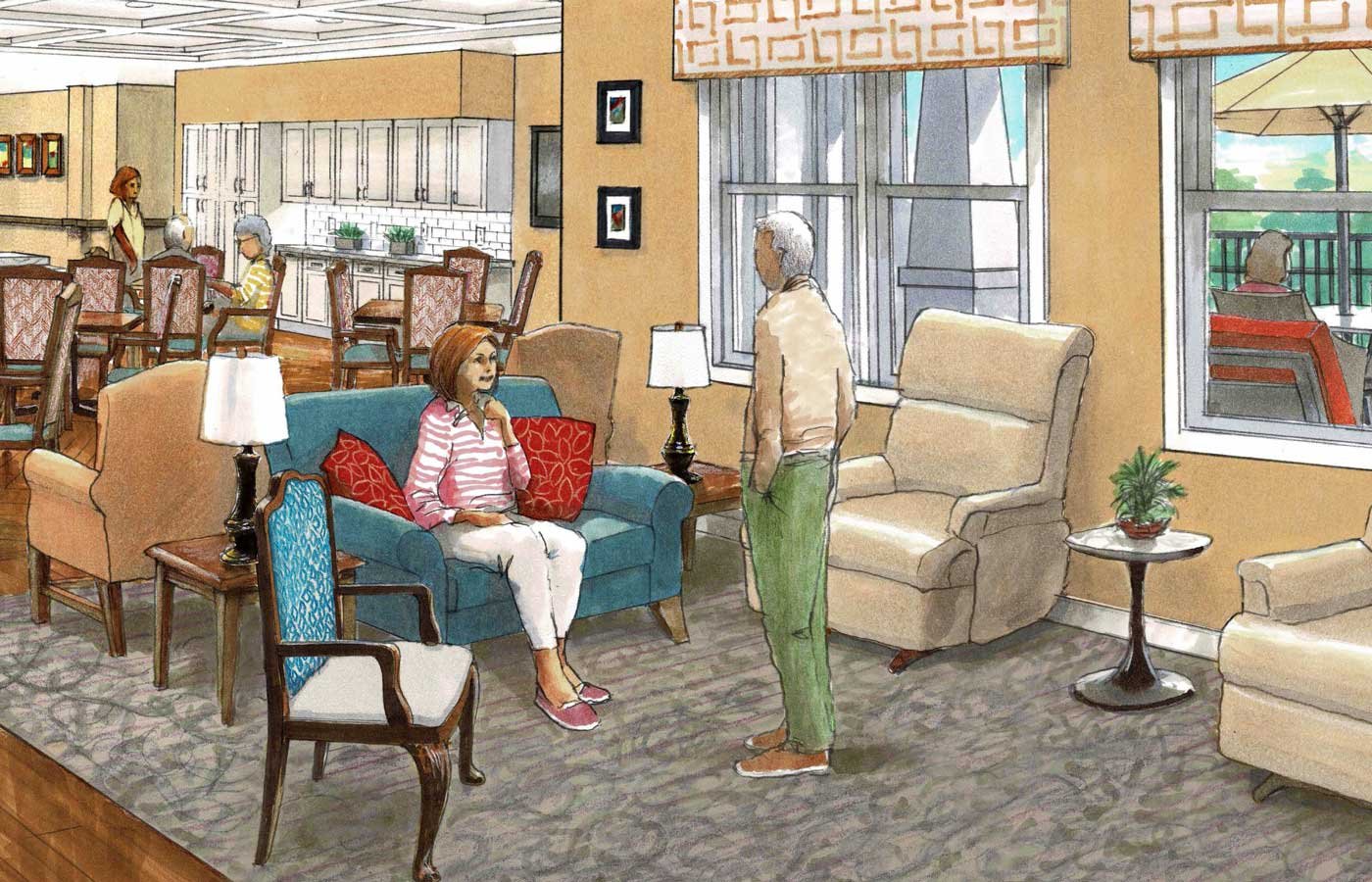
Bryan Berman is the household coordinator of Morton House West at Episcopal Church Home and recently sat down with us for a Q&A about memory care at ECH.
Great to talk with you, Bryan. How will a family know that it’s time for their loved one to become a memory care resident?
Bryan: That’s a hard question because a family could come in thinking their loved one is ready for memory care. If it goes to the point that they want to gain admission, there has to be an assessment by our nursing team. And sometimes, when they do those assessments, they might assess that actually, your loved one is past the point of memory care, and they could have to go into skilled care. That would be the next level of care that we have here. Or, possibly, they’re ready for memory care. So it depends on the assessment the nursing team does.
In our memory care neighborhood, our ratio is about 5 or 6 residents to 1 team member. That’s if we were completely full. Actually, our ratio is a little bit better because we’re not full.
You’re making use of person-centered care through the use of versatile workers.
Bryan: Yes. The state of Kentucky requires all versatile workers to be certified, nursing assistants. Some of their responsibilities are to provide assisted daily living (ADLs) – anything a resident may need on the nursing side. They also participate in resident activities and participate with dining services with that resident or in their group. They’re also responsible for housekeeping residents’ rooms and shared areas of the residents. So one person has four different responsibilities.
What’s the benefit to the resident of having versatile workers?
Bryan: Continuity, for one. Our versatile workers try to have you stay with the same group of residents every day. So that resident becomes very familiar with the team member, and we become very familiar with that resident – for their daily needs, their habits, or the things that they like or dislike. So it’s familiarity. And you’re able to anticipate the needs of your resident because you know what their needs are. The continuity of that one versatile worker per shift taking care of their assigned group daily is much better for the resident because you’re building relationships.
And how is being a versatile worker beneficial to the team members themselves?
Bryan: It’s beneficial to them in a few ways. Number 1, you can gauge your day because you have these responsibilities, such as activities, dining, and housekeeping. You know those are the responsibilities that you have. So, for instance, let’s say you have Miss Smith. You know Miss Smith wakes up every morning at 10. So, you’re already at work for a couple of hours, and you can adjust your schedule to get those other responsibilities done prior to Miss Smith getting up or prepping Miss Smith for breakfast because our residents don’t all eat at the same time. We’re on their schedule; they’re not on ours. So we schedule our day around them. They don’t schedule around us in their daily lives. So again, we can anticipate the needs of residents on an individual basis versus a group situation where you would say, ‘Lunch is at 12,’ and you get everybody together at 12. In our more individual approach, we are serving lunch at 12. You don’t have to come at 12, because you can get lunch earlier, or you can get lunch later.
That’s the person-centered aspect of it.
Bryan: Exactly. It’s about their freedom of choice. And also, we have activities scheduled throughout the day. Our first activity of the morning is usually exercise. That’s at 10:15. And we have our regulars that go to exercise. You don’t have to go to exercise if you don’t want to. And a lot of other nursing facilities, they’ll say, “Exercise is at 10:15,” and they’ll make sure everybody gets there, whether they want to go or not. And residents have the freedom to make that choice, whether they want to go or not.
Tell us about some activities in memory care.Bryan: We schedule activities seven days a week. One thing we always have is exercise every morning at 10:15. And then we’ll have anywhere between three and six activities throughout the day, depending on the day and what’s going on. They’re always resident-involved, but one thing we have in memory care is we have Baking in the Kitchen. Sometimes we have residents who want to gather and just watch us bake. And we have other residents – we encourage them to participate. They actually bake something that reminds them of home. If there is a favorite recipe or something they really enjoy, we’ll find a recipe for it, and we’ll make it one-on-one or as a group. We bake in the kitchen at least once a week, but it’s not resident-involved every week.
Of course, you think older adults, you think BINGO. We have avid BINGO people. We cannot change our BINGO day. It has to be every Tuesday afternoon at 3:30. They enjoy BINGO extremely.
Tell us about other activities, the ones that involve music.
Bryan: We have two pianos in our neighborhood. We have outside entertainment that comes in three times a month. We usually have three to four, depending on the month. We have people come in who provide music and singing for the residents. The ones they seem to enjoy most are standards from their generation.
We have chapel services every Sunday in our neighborhood. Plus, once a week, our chaplain, The Rev. Lisa Tolliver, does a Bible study group. It’s called Bible and Culture. She does that three times a month.
For someone who is evaluating memory care options in the Greater Louisville area, why should they choose ECH’s memory care?
Bryan: Because we’re a great place. Episcopal Church Home has been in the city of Louisville since 1881. And I believe – and I’m not just saying this because I work here – we have a pretty stellar reputation in the community. And partnering with Episcopal Retirement Services six ago, they have brought fresh eyes to our campus, and we’re improving our physical surroundings. We tore down our old healthcare building, and we’re building 22 new personal-care apartments, which everybody’s excited about because it’s going to be brand new. And our person-centered care, in a lot of places, you don’t have our ratio of one staff member to 5 or 6 residents. In a lot of places, that ratio could be 10-to-15 residents per team member. We’re truly person-centered care.
 Lyndon House personal care apartments will be open in 2022.
Lyndon House personal care apartments will be open in 2022.
The new physical environment, how will it be better?
Bryan: Our old healthcare building was outdated. There were long hallways with rooms on each side. It looked like a hospital. When Morton House was built, it was built as a groundbreaking model at the time because there were intimate households. Within the Morton neighborhood, there are four little households, and each is connected by a kitchen. So there are four different areas for residents, with two adjoined by a kitchen and another two adjoined by a kitchen. We have common areas, we have living areas where they can watch a little television, and they can enjoy little social hours. We also have a larger activity area that is flanked outside by an outdoor courtyard that’s fenced in. In nice weather, they can go out and enjoy that. We also have another patio that faces toward the front of our building, and they can enjoy that. And once our new Dudley Square III patio homes are built, they will replace a fence that they had to take down, so they’ll have even more area to explore outside.
Another great thing about our personal care apartments and Morton House in general – skilled or personal care – is we have an on-site chapel, St. Luke’s Chapel. In our old healthcare building, everything is connected. You were able to go to St. Luke’s Chapel without going outdoors. It has an outside entrance for people to come in. But you were able to access the chapel from the interior of the building. A great thing is they have connected that again, so no resident will have to go outside to get to the chapel. We’ll just go straight through the whole building.
What’s the best thing about working at Episcopal Church Home?
Bryan: For me, it’s the connection I have with residents. I’ve worked here a long time, and prior to working here, I was working in a local bank. I came here because I had a friend who worked in dining services at the time, and he told me they were hiring. I thought I’d go check it out. I wasn’t full-time then, but you really get touched by some of these residents. And it’s hard not to be taken into them, and everything that they’ve done, and they talk about. When people say, it’s truly a calling, I kind of used to think, ‘Eh, I don’t feel that way.’ But it truly is. I mean, when you work with older people, and even though they’re at the last stages of their life, they still have so much to offer. A tough thing for me is when the ones you get attached to when their time has come. It’s hard for a lot of us around here. Because we’ve had some kind of person-centered care for years. We’ve just more concentrated on person-centered living now, but we’ve kind of had it in the past, and it’s again those relationships you build with residents, day in and day out. That’s what would be most for me: Relationships with residents and also the relationships you build with the people that you work with every day. We have people who have been here for a while, and they become like family – your work family.
To learn more about the assisted living memory care studio apartments available at Episcopal Church Home, call Gry Seymor at (502) 396-8987 or fill out our information request form.












